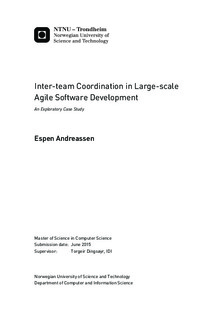| dc.description.abstract | In later years agile development methodologies have seen a steady growth. Agile approaches were originally developed for small-scale contexts to cover the increasing need for flexibility and the urge to be first-to-market with technology in constant change. The benefits witnessed in this small-scale adoption has got large organisations to open their eyes. Therefore, it has not been surprising to see large-scale software development projects opt for the use of agile methodologies. However, the research regarding agile development in a large-scale context is still scarce.
Another aspect that has seen an increasing focus in the later years has been coordination and coordination effectiveness, which are identified as important factors in software development and team performance.
These two aspects are combined and looked further into in this research study. The focus is on robust empirical studies performed on coordination in large-scale agile software development projects, as well as an exploratory case study carried out at a Norwegian large-scale agile software development project. The findings from this case study was then compared to previously published research and theory on coordination.
The main findings showed mainly similarities between existing studies and the research performed in this master thesis. The most prominent coordination mechanisms and aspects identified as having a positive effect on coordination and team performance were co-location, informal communication, presence of project management and owner, continuous change and improvement, mutual trust, and shared mental models. However, some dissimilarities were also present. The most noticeable of these were how informal communication arenas were existent to a large degree in the case project despite some previously conducted research concluding that such arenas should decrease when team and project size gets large.
Keywords: Large-scale; MTS; Multi-team systems; Coordination; Coordination Effectiveness; Agile; Software Development; Software Engineering; Scrum; Mutual Trust; Shared Mental Models; Co-location; Informal Communication; Continuous Change and Improvement; Presence from Management; On-site Customer | |

